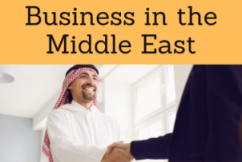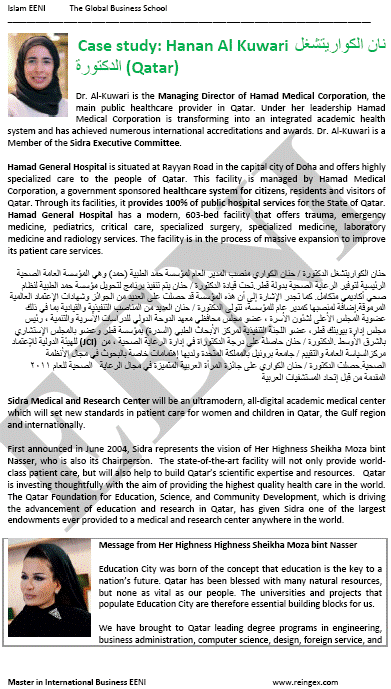Business in Qatar. Qatari Economy

Foreign Trade and Business in Qatar: first country by GDP per capita. Doha
- Introduction to the State of Qatar (Middle East)
- Business in Doha
- Qatari Economy
- Foreign Trade of Qatar
- Business Opportunities in Qatar:
- Hydrocarbons
- Construction
- Major projects
- Public sector
- Investment in Qatar
- Case Study:
- Hanan Al Kuwari
- Al-Jazeera
- Access to the Qatari market
- Business Plan for Qatar
The objectives of the subject “International Trade and Business in the State of Qatar” are the following:
- To analyze the Qatari Economy and Foreign Trade
- To know the trade opportunities in the State of Qatar
- To explore the Qatari trade relations with the country of the student
- To know the Qatari Trade Agreements
- To examine the profile of Qatari companies
- To develop a business plan for the Qatari market

The Subject “Foreign Trade and Business in Qatar” belongs to the following Online Programs taught by EENI Global Business School:
Doctorate: Islamic Business, World Trade.
Master: International Business.
- Credits of the subject “Doing Business in Qatar”: 1

- Duration: one week

 Masters adapted to Qatari Students.
Masters adapted to Qatari Students.
International Trade and Business in Qatar
Qatar is the first country in the World by GDP per capita.

- China-Pakistan Corridor
- Kyrgyzstan-Iran Corridor
- Qatar withdrew from the Ashgabat Agreement

Qatari Preferential Access and Trade Agreements:
- Qatar and the Arab Economic Area
- Gulf Cooperation Council (GCC): Saudi Arabia, Kuwait, Emirates (UAE), Oman, and Bahrain.
- Qatar has trade agreements (as a GCC Member) with China, South Korea, Australia, the EFTA, New Zealand, India, Thailand, the EU, Singapore and the MERCOSUR
- Islamic Trade Preferential System
- Islamic Centre for Development of Trade
- Greater Arab Free-Trade Area (GAFTA)
- Arab Bank for Africa (BADEA)
- SICA (observer)

- WTO
- GATS
- Agreement on Sanitary Measures
- Agreement on Technical Barriers to Trade
- Agreement on Preshipment Inspection
- Agreement on Safeguards
- Trade Facilitation Agreement
- WCO
- IRU
- TIR Convention
- Guidelines on Safe Load Securing for Road Transport
- BIC (Containers)
- IMO
- Istanbul Convention - not a member
- Customs Convention on Containers - not a member
Qatar is a member of the Cooperation Council for the Arab States of the Gulf

- Arab League
- Summit of South American-Arab Countries
- Asia-Middle East Dialogue
- Islamic Development Bank
- Economic Commission for Western Asia (ESCWA)
- OIC
- Committee for Economic Cooperation
- Islamic Chamber of Commerce
- Islamic Centre for Development of Trade
- Economic Centre for Islamic Countries
- Arab Trade Financing Programme
- Arab Development Funds
- OPEC Fund for International Development (OFID)
- Afro-Arab Cooperation
- BADEA
- Arab Gulf Programme (AGFUND)

- Asia Cooperation Dialogue
- UN
- UNCTAD
- ITC
- WIPO
- WB
- WTO
- IMF
The State of Qatar:
- The population of Qatar amounts to 1.5 million people, of whom 83% lives in Doha (Qatar's political capital) and its main suburb Al- Rayyan
- Arabic is the official language in Qatar
- Qatar shares borders with Saudi Arabia
- Abolition of Slavery in Qatar: 1952
- Independence of Qatar from the UK: 1971

Religion in Qatar: Islam Sunni is the principal religion of Qatar
- The main school of Islamic Jurisprudence is Hanbali

Qatar belongs to the Arab Economic Area.
Qatari Economy
- Qatar is the international financial centre of the Gulf region
- In 2001, Doha hosted the first ministerial-level meeting of the Doha Round of the WTO
- Al- Jazeera (the leading international Arab media communication) headquarters are in Doha
- Qatar is a very open economy
- Petroleum, natural gas, and related industries make up most of the Qatari economy
- Qatar produces less than 1% of the world petroleum production
- Crude oil and liquefied natural gas account for 80% of the exports of Qatar
- Qatar, like other countries in the Gulf region, is being affected by the international financial and economic crisis, including by the decline in international demand for hydrocarbons, both in quantity and value

International Trade of Qatar
- Total Foreign Trade (imports + exports) related to its GDP stands at 95%
- Main imports of Qatar: the EU, Japan, the U.S., Saudi Arabia, and South Korea
- Qatar Exports mainly to Japan, South Korea, Singapore, and the EU
- The largest Qatari export products are hydrocarbons (petrol and gas), fertilizers and chemicals, and steel products
- The largest Qatari imports are machinery, primary metals, cars and other means of transport, food, chemicals, and building materials
- In the States of Qatar is required to work with a Qatari import agent/distributor (natural or legal person) who has the exclusive distribution rights for Qatar
Qatar is negotiating other Free Trade Agreements with the United States, Japan, and Australia. Qatar also has signed economic agreements with France, Germany, Romania, China, Senegal, India, Cuba, Switzerland, Finland, and Turkey.
(c) EENI Global Business School (1995-2024)
We do not use cookies
Top of this page




 or
or 
